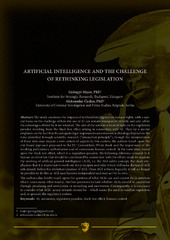Приказ основних података о документу
Artificial intelligence and the challenge of rethinking legislation
| dc.creator | Major, Gyöngyi | |
| dc.creator | Čudan, Aleksandar | |
| dc.date.accessioned | 2022-01-26T11:00:10Z | |
| dc.date.available | 2022-01-26T11:00:10Z | |
| dc.date.issued | 2021 | |
| dc.identifier.isbn | 978-86-7020-470-6 | |
| dc.identifier.uri | http://eskup.kpu.edu.rs/dar/issue/view/6/4 | |
| dc.identifier.uri | http://jakov.kpu.edu.rs/handle/123456789/1291 | |
| dc.description.abstract | The study examines the impacts of artificial intelligence on human rights, with a spe-cial focus on the challenge of how the use of AI can remain transparent, reliable and safe, while the advantages offered by it are retained. The aim of the authors is to shed light on the regulation paradox resulting from the black box effect arising in connection with AI. They lay a special emphasis on the fact that the adequate legal responses to an unknown technology depend on the risks identified through scientific research (“precaution principle”), though the interpretation of these risks may require a new system of aspects.In this context, the authors touch upon the risk-based approach proposed in the EU Committee’s White Book and the importance of the resulting preliminary authorisation and of continuous human control. At the same time, based upon the black box effect, which is a regulation paradox, the following dilemma is raised: Is it human or robot law that should be constituted?In connection with the efforts made to regulate the working of artificial general intelligence (AGI), i.e. the AGI safety concept, the study em-phasises that it is important to work out the principles and rules which will make the use of AGI safe already before the evolution/creation of AGI. Once AGI is there, logically, it will no longer be possible to do this as AGI may become independent and may act by its own. The authors also briefly touch upon the question of what AGIs can and cannot do (a question which raises many other issues). Further questions include whether AGIs should be controlled through penalising and restrictions or rewarding and motivation. Consequently, it is necessary to consider what AGIs’ actual rewards should be – which raises the need to redefine regulation and, in general, the regulatory system. | sr |
| dc.language.iso | en | sr |
| dc.publisher | Belgrade : University of Criminal Investigation and Police Studies | sr |
| dc.rights | openAccess | sr |
| dc.rights.uri | https://creativecommons.org/licenses/by/4.0/ | |
| dc.source | Thematic conference proceedings of international significance [Elektronski izvor] / International Scientific Conference "Archibald Reiss Days", Belgrade, 9-10 November 2021 | sr |
| dc.subject | AI | sr |
| dc.subject | autonomy | sr |
| dc.subject | regulation paradox | sr |
| dc.subject | black box effect | sr |
| dc.subject | human control | sr |
| dc.title | Artificial intelligence and the challenge of rethinking legislation | sr |
| dc.type | conferenceObject | sr |
| dc.rights.license | BY | sr |
| dc.citation.spage | 537 | |
| dc.citation.epage | 546 | |
| dc.identifier.rcub | https://hdl.handle.net/21.15107/rcub_jakov_1291 | |
| dc.identifier.fulltext | http://jakov.kpu.edu.rs/bitstream/id/5701/bitstream_5701.pdf | |
| dc.type.version | publishedVersion | sr |


